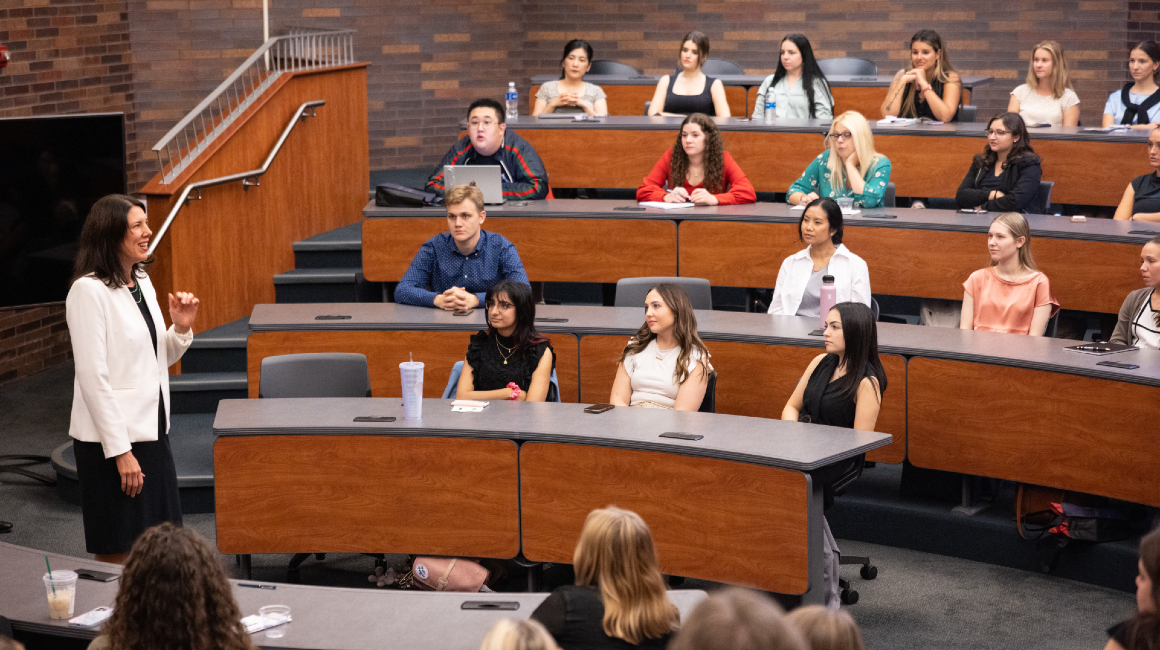The Thomas R. Kline School of Law of Duquesne University offers students the option to focus on a specific field of legal study through concentrations. Students may choose to apply for a concentration in Civil Litigation, Criminal Law, Law and Computing, and Transactional Legal Practice.
- Each Concentration requires students take four (4) elective courses of at least two (2) credits each, including one course that has a significant experiential or writing component. These four (4) courses must be on a list of courses approved by the faculty upon recommendation from the Curriculum Committee. The list of approved courses for each concentration will be maintained on the Registrar’s webpage.
- No course will count towards fulfillment of a Concentration if the student received a grade of C+ or lower. One pass-fail course in which a student received a passing grade may be counted towards fulfillment of a Concentration.
- An externship may only count towards satisfaction of a Concentration if the externship focuses exclusively on matters within the scope of the Concentration. To have an externship count towards satisfaction of a Concentration, the student seeking the Concentration must obtain written approval from the Clinic Director and either the Chair of the Curriculum Committee or the Associate Dean for Academic Affairs by, at the latest, the end of the add/drop period for that externship.
- The student seeking to obtain a Concentration must complete a Concentration Intent Form, which is available on the School of Law Registrar’s website, and return it to the Registrar’s office no later than the end of the semester preceding the semester in which a student graduates. In most cases, this will be the Fall semester of a student’s final year of study.
Course Options
- Appellate Moot Court (varies)*
- Appellate Practice and Procedure (2 credits)
- Art of Mediation (2 credits)*
- Civil Rights Litigation (3 credits)
- Deposition Skills (2 credits)*
- Environmental Enforcement, Litigation, and Negotiation (2 credits)
- Expert Evidence Simulation (3 credits)*
- Federal Litigation Clinic (2 credits)*
- Introduction to Alternative Dispute Resolution: A Lawyer’s Practicum (2 credits)*
- Judicial Externship (variable)*
- Negotiation Skills (2 credits)*
- Pennsylvania Civil Procedure (3 credits)
- Pennsylvania Pretrial Civil Litigation Simulation (3 credits)*
- Pleading and Discovery Simulation (2 credits)*
- Pretrial Civil Litigation Simulation (3 credits)*
- Trial Advocacy (3 credits)*
* Qualifies for the experiential requirement
- Criminal Prosecution Program (3 credits)*
- Federal Criminal Law Simulation (3 credits)*
- Functions & Duties of the Prosecutor (3 credits)
- Human Trafficking (3 credits) (ULWR)
- International Criminal Law (3 credits)
- Legal Medicine & Forensic Science (2 credits)
- PA Innocence Project (3 credits)*
- Public Defender Program (3 credits)*
- Sanctions, Sentencing & Corrections (2 credits)
- State Attorney General Law (2 credits)
- White Collar Crime (2 credits)
- Wrongful Convictions (2 credits) (ULWR)
- Coding for Lawyers (3 credits)
- Statistics and Machine Learning for Lawyers (3 credits)
- Natural Language Lawyering/Simulation (doctrinal- 2 credits, simulation- 3 credits)
- E-Discovery Simulation (3 credits)*
- Text Analytics (at Pitt Law)
One approved course in the computer science dept (credit varies)
* Qualifies for the experiential requirement
Please visit the Law and Technology page for additional information.
- Advising Startups and Small Business Planning (3 credits)*
- Accounting for Lawyers (2 credits)
- Antitrust (3 credits)
- Basic Federal Income Tax (3 credits)
- Bankruptcy (3 credits)
- Contract Drafting Simulation (3 credits)*
- Law of Supply Chains (2 credits)
- Mergers & Acquisitions Simulation (2 credits)*
- Negotiations & Commercial Transactions (2 credits)*
- Securities Regulation (3 credits)
Students must take at least two (2) of starred courses, which satisfy the experiential learning requirement.
Other transactional practice-related courses may satisfy this elective requirement, at the discretion of the Associate Dean for Academic Affairs.


